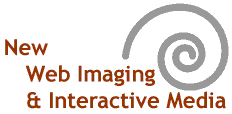|
Adobe Systems defines
the graphic language of publishing and hopes soon the internet. Postscript,
the language of fonts and visual display launched a desktop publishing
industry and revolutionized graphical communication. Postscript was the
skeleton and platform for the birth of the Portable Document Format (PDF)
which brought professional looking documents to various distribution models
including internet, CD-ROM, and print. Due to the aggressive marketing
of Adobe, the PDF format has become an internet standard for document
circulation.
Adobe is on the advent of a new era of publishing based on the foundations
of Postscript and PDF, using the same imaging and typography model that
runs the backbone of Adobe products like Photoshop and Illustrator. Code
named Bravo, this web imaging solution would allow the display of high
quality, scalable, and web savvy images over the internet. During a presentation
in May 1996 call “Improving Net Expectations” Adobe launched an effort
to unify web graphics by deploying the Bravo Imaging Model into a revolutionary
product code named “Vertigo.” The Bravo imaging and typography model was
licensed to Sun Microsystems for inclusion as the default Java 2D imaging
solution. Alas the visionary interactive media authoring tool "Vertigo"
never appeared, and Sun neglected to include the Bravo model in Java.
The one thing that should appear from the near four year development effort
is the new page layout program InDesign.
At the Fall Internet World 1998 in New York Adobe CEO John Warnock previewed
the web technology, at that time called PGML to display colors accurately
and web enable vector graphics. At Showcase 1999, PGML was repackaged
as SVG and submitted to the W3 consortium, which takes us to our next
promising imaging solution.
For more information look at:
|

